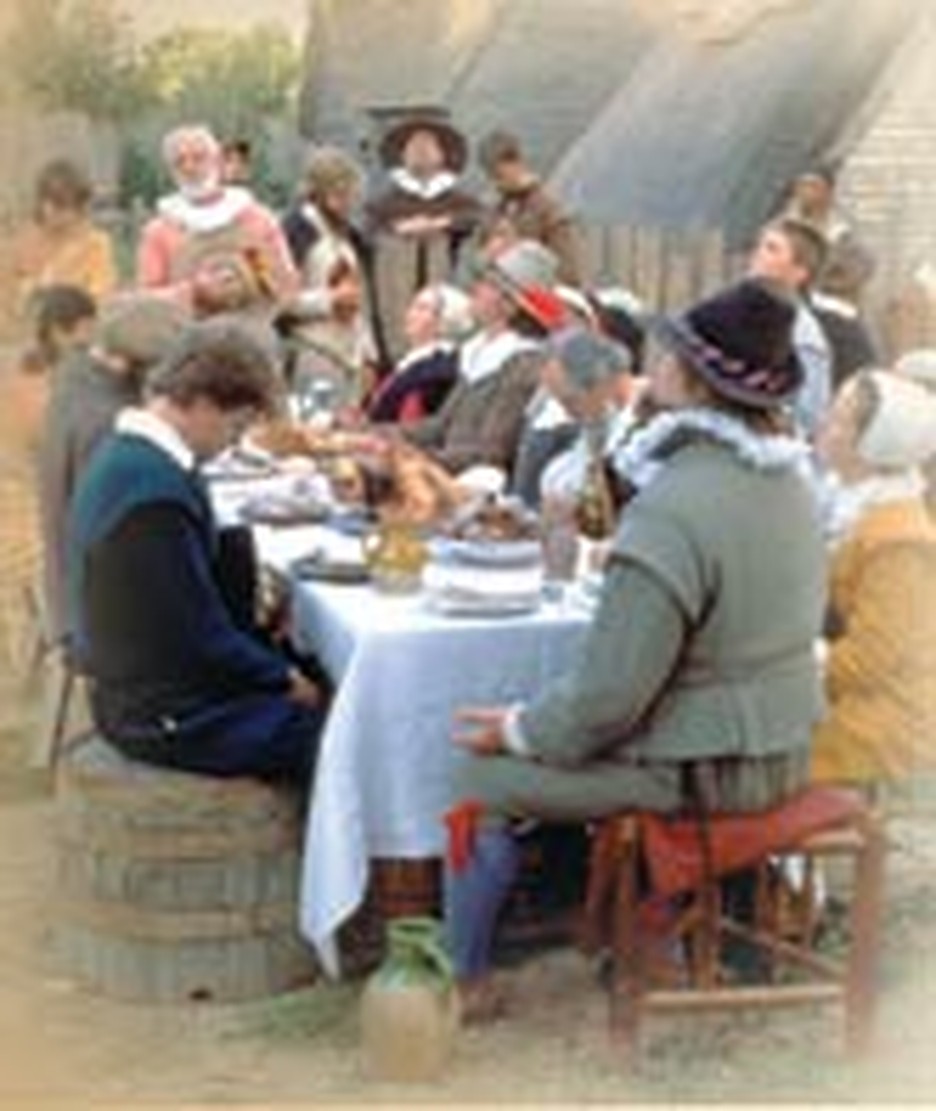
Thanksgiving for Avoiding an Explosive Situation
Thanksgiving was celebrated in England prior to the pilgrims coming to America. The first annual day of thanksgiving instituted in England was for the discovery of the Gunpowder Plot. On November 5, 1605, Guy Fawkes was captured standing guard over 36 barrels of gunpowder hidden in a vault under the House of Lords. He and his accomplices planned to blow up Parliament on its opening day, with the king, the royal family, the House of Lords, and the Commons in attendance. The leadership of England would be destroyed in one massive explosion. In this way the Catholic conspirators hoped to rid England of the disease of Protestantism! That the conspirators were discovered before any harm was done was certainly cause for thanksgiving. The traitors were arrested and executed, and parliament ordered November 5 to be kept as a "public thanksgiving to Almighty God." This was to be an annual day of thanksgiving, "that unfeigned thankfulness may never be forgotten, and that all ages to come may yield praises to God's divine majesty for the same." Guy Fawkes Day continues to be celebrated in England.
Holidays and Holy Days in Early America
In the sixteenth century the church calendar was full of saints' days and annual days of fasting which many of the Reformers thought were unbiblical. Since the Scriptures themselves did not establish any Christian festivals, some reformers sought to abolish all but the feasts connected with the life of Christ and Sundays. The English Puritans especially protested the many pagan associations which had been incorporated into the Church feasts. They believed the Sabbath itself was to be a weekly reminder and celebration of Christ's resurrection.
But the Puritans believed there should be special days of fasting or thanksgiving related to the workings of Providence in their own lives or in national and international affairs. Terrible happenings such as earthquakes, plagues, and political turmoil called for days of fasting to examine their souls and pray for forgiveness. Victories and blessings called for special days of thanksgiving to offer praise to God.
These Fast Days or Days of Thanksgiving were not annual holidays but were special days called at various times in response to the way they saw God was dealing with the people. They were responses to the works of Providence. Often, there were several days of fasting or thanksgiving called within a single year.
On a fast day, in the early morning families would have family prayers and Bible reading. They would not wear rich clothing or ornamentation when they went to the congregational meeting, where there would be preaching, singing of psalms, and prayer. The sermon would usually include a graphic narrative of God's deliverance and blessing. Thanksgiving days also included a community feast and refreshment. Both Fast and Thanksgiving Days were special Sabbath days on which there was to be no work nor any recreation. These were days set apart to commune with the Lord and have the spirit shaped by His Word.
A Providential Tale
William Bradford's History of Plymouth Plantation is one of the greatest histories of settlement in the New World. Governor Bradford's History is a detailed, fascinating description of the political, spiritual, and economic history of the colony written from a providential perspective, but even the manuscript itself has a providential story! Apparently a British soldier obtained the manuscript during the American Revolution and took it to England with him. Somehow Bradford's manuscript found its way into the hands of the Bishop of London. In 1897 the US ambassador to England was able to arrange for the manuscript to be returned to the Massachusetts Historical Society, where it now remains.
One Lady's Tireless Efforts to Give Us Thanksgiving Day
During the 19th century, the magazine which set the standard for ladies' fashion as well as feminine behavior was Godey's Lady's Book, edited by Sarah Hale from 1837 to 1877. Mrs. Hale's lawyer husband died young, leaving Sarah with 5 children to raise. She turned to writing and wrote novels and poems, including "Mary's Lamb," before taking a career as a magazine editor.
In Godey's, Sarah argued that women had superior gifts in piety and tact, and that their primary calling was in the home, not in the public arena. She favored education for women to help them pursue their calling in education, medicine, and missions. Sarah served as an officer in the Women's Union Missionary Society and the Ladies' Medical Missionary Society of Philadelphia. In the pages of Godey's and elsewhere Sarah advocated a national day of Thanksgiving. She tirelessly worked towards her goal for over fifteen years before Lincoln issued his Thanksgiving Proclamation in 1863.
Chronology of Thanksgiving
- 1605--Annual day of thanksgiving proclaimed in England for discovery of the Gunpowder Plot.
- July 23, 1623--First day of thanksgiving proclaimed in Plymouth colony....for rain after a drought.
- 17th century--Repeated days of Thanksgiving in New England for special events, such as friends arriving safely from England, protection from Indians, etc.
- By 18th century, annual springtime fasts and autumn Thanksgiving days proclaimed in New England.
- December 18, 1777--Continental Congress proclaimed first national day of Thanksgiving for Gen. Burgoyne's surrender at Saratoga.
- November 26, 1789--G. Washington proclaims a national thanksgiving day for adoption of Constitution.
- February 18, 1815--President Madison called for National Thanksgiving at end of War of 1812.
- By early nineteenth century, most States were proclaiming autumnal days of Thanksgiving.
- 1846--Sarah Hale begins advocating a national Thanksgiving celebration, believing this spiritual means would unify and preserve the nation.
- September 6, 1863--Abraham Lincoln issues a Thanksgiving proclamation after Gettysburg.
- November 26, 1863--Lincoln issues first annual Thanksgiving proclamation, continued by presidents to the present day.
- July 4, 1876--President Grant proclaimed a day of Thanksgiving for a century of blessings on the nation.








